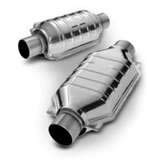

|
|
We Are The Cat Experts
Find the factory replacements you need in stock now. When your automobile's
catalytic converter fails, performance and smog compliance follow.
That's why it's important to keep all your parts in tip-top shape.
Replace your catalytic converter for less and keep your vehicle in
check. When you come to Wotton Tyre & Exhaust Centre, you always
get the best deal. Guaranteed low prices and expert workmanship set
our catalytic converters and exhaust accessories apart from the rest.
Save serious money by getting your replacement catalytic converter
from us. Unlike the dealerships that milk you for all you're worth,
replacement catalytic converters from Wotton Tyre & Exhaust Centre
cost less and are installed quickly and professionally. Don't let
the dealer empty your wallet or the smog police shut you down—Wotton
Tyre & Exhaust Centre has catalytic converters and everything
you need to keep the exhaust pumping for less.
|
| |
|
| |
If you are having any problems locating the part you
require, please call our highly trained and friendly staff, we are on
hand Monday-Saturday to deal with any technical questions you may have.
We have the widest and most competitively priced range of Catalytic
Converters in the UK. We sell the full range of Timax Cat's. |
| |
|
| |
All of our Catalytic Converters are vehicle specific
- this means that the cats we supply will fit directly onto your vehicle
without any modifications. They are exactly the same size and fitting
as the ones available from franchised dealers, but at a fraction of
the cost. |
| |
|
| |
What is a catalytic converter?
A catalytic converter is a device used to reduce the toxicity of emissions
from an internal combustion engine. It was first introduce in 1975 to
comply with the tightening Environmental Protection Agency (EPA) regulations
on auto exhaust. The catalytic converter provides an environment where
chemical reaction can occur that will change toxic combustion by-products
to less toxic ones. |
| |
|
| |
The catalytic converter is an integral part of the exhaust
system. There are two types of catalytic converter: The three-way which
refers to the reduction of nitrogen oxides, oxidation of carbon monoxide,
and oxidation of un burnt carcinogenic hydrocarbons, and the two-way
catalytic converter which has two simultaneous tasks of oxidation of
carbon monoxide and oxidation of the hydrocarbons and was widely used
on all engines in the US until 1981 when the regulation changed to include
the control on NOX emissions. A catalytic converter has several components
like the core or substrate made of ceramic honeycomb whose function
is to support the catalyst, the washcoat, which is a mixture of silicon
and aluminium that is added to the core to give a larger surface area,
and lastly, the catalyst, which is most often made of precious metal.
Platinum and rhodium are used as a reduction catalyst, while platinum
and palladium are used as an oxidization catalyst. |
| |
|
| |
|
Catalytic converters can suffer from catalyst poisoning
and become ineffective in the presence of lead. Some conditions like
a crack in the valves, oil in the exhaust system or ignition failure
all of which can cause the catalytic converter to overheat and meltdown. |
| |
|
|
| |
|
 |

